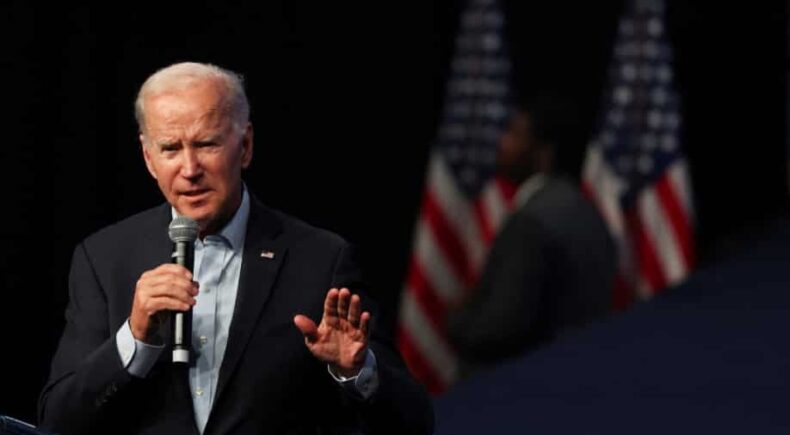Republicans have seen a jump in their prospects in recent weeks, with polls indicating they are all set to win control over the House of Representatives. Also, they have gained momentum in the conflict in the Senate.

America will hold its midterm elections on Tuesday, after an ardent weekend of campaigning by both the parties, and amidst a wider sense that Republicans in the final lap of the elections have jumped ahead.
Voters are ready to elect all 435 members of the House of Representatives, 36 state governors, 35 members of the Senate, 27 Secretaries of State and 30 attorney generals, besides other state and local races in an election that will set the stage for 2024 and determine the future of the Joe Biden presidency.
The Senate landscape
The Senate is equally divided 50:50 at the moment, with Democrats getting a majority of votes by Vice-President Kamala Harris, but this majority will be at risk by the flip of one seat.
In Pennsylvania, opening room for Democrats to make a bid for the seat, a Republican senator retired. But while John Fetterman, a party candidate, began with an advantage, a stroke augmented doubts about his health.
The Republican candidate, Mehmet Oz’s fierce charges on Democrats on crime has also given momentum to the Republican ticket.
Saturday saw a rare conflux of three presidents, Trump for Republicans, Biden and Obama for Democrats campaigning in this important battleground state.
Democratic senator Raphael Warnock in Georgia is defending his seat against a challenge from Trump acolyte who has got embroiled in a series of personal scandals and Republican Herschel Walker who’s a former football star. In Arizona, Nevada and New Hampshire, Republicans have initiated an offensive against Democrat incumbents, while Democrats are intending to make inroads in Wisconsin and take a seat held by a Republican.
How the race got evolved
The Republican momentum for the Senate race is a broad reflection of how over the year, the midterm battle has evolved.
The Republicans started with a clear advantage, earlier in the summer. The Grand Old Party had been given momentum on national security issues by the American exit from Afghanistan in 2021, which also reflected in the party’s win last year, in Virginia’s gubernatorial race. The battle between Democrats and progressives had held legislation in the US Congress hostage. And, the Supply chain disruptions continued as the pandemic-induced, amidst an infusion of liquidity in the economy, inflation started to emerge as a important concern among voters.
Key culture war issues were also picked on by Republicans, particularly education which they set up as an “parental control” issue and built a campaign opposing the pedagogy on sexuality and race in school. The perception of Biden for the job being too old, and apparently without control of his very own party, added to the Republican push.

The momentum was seen to shift back to Democrats in late summer
Biden and his team on national security, started to campaign around the transatlantic coalition which they built up in opposition to Russia’s war in Ukraine. The president also managed to get a raft of legislation on climate through in the Congress, domestic American manufacturing mainly with regard to semiconductors, and decreasing social welfare benefits and prescription drug prices including an infrastructure investment act that he had pushed last year, through the Congress.
But, the ray of political hope for Democrats on abortion came from the Supreme Court verdict which made abortion a state subject and overturned Roe v Wade. With polls constantly showing that most of the voters were opposing a ban on abortion, Democrats hoped to capitalise on the anger in opposition to the extremism which had resulted in overturning the national right to abort in Trump’s judicial nominees. The fact that many of the Republican Senate candidates who were seen as extreme were Trump-backed candidates, and potentially suburban voters alienating, also encouraged the Democrats. A sequence of high-profile gun-violence cases seemed to shift public mood in support of difficult gun control measures, a theme that reverberates with the Democratic platform.
Republicans once again gained ground as elections approached
The economy in general and inflation and the cost of living in particular were the single most important issues for voters. Voters repeatedly told pollsters that they have seen Republicans as much better equipped than Democrats to deal with these issues, even as Biden exploited policy instruments, including America’s strategic petroleum reserves release, to decrease the price of gas. The administration’s effort didn’t seem to have enough buyers to blame Vladimir Putin for inflation, nor did its endeavor to waive off student loans partly win it the extra support that it was hoping for. And it appeared abortion may not be as great a mobilizational issue as the party hoped for.
Read More: Mid-term election: why Joe Biden’s presidency is at stake












